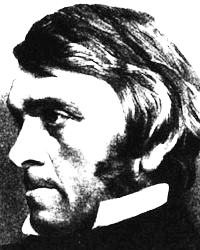
"A musical thought is one spoken by a mind that has penetrated into the inmost heart of the thing; detected the inmost mystery of it; namely the melody that lies hidden in it; the inward harmony of coherence which is its soul, whereby it exists, and has a right to be, here in the world. All inmost things, we may say, are melodious, naturally utter themselves in song."
Sartor Resartus ("The Tailor Re-tailored"), Carlyle's spiritual autobiography, contains, explicit or implicit, all his basic teachings. First published as a serial in Fraser's Magazine (November 1833 to August 1834), seen through the American press by Emerson, published in England as a book in 1838. Carlyle wears a mask (he spoke of it as a "Didactic Novel....a kind of 'Satirical Extravaganza on Things in General."), but he has admitted that the book "contains more of my opinions on Art, Politics, Religion, Heaven, Earth, and Air, than all the things I have yet written."
Heroes and Hero-Worship was delivered as a series of six lectures in May 1840.
Lecture III
The Hero as Poet. Dante; Shakespeare
"The Poet is a heroic figure belonging to all ages; whom all ages possess."
Past and Present contains Carlyle's principal contemporary social criticism. ("written off with singular ease in the first seven weeks of 1843"). Carlyle: "The thing I am upon is a volume to be called 'Past and Present.' It is a moral, political, historical, and a most questionable red-hot indignant thing, for my heart is sick to look at the things now going on in England." The volume is divided into four books: I. "Proem"; II. "The Ancient Monk"; III. "The Modern Worker"; IV. "Horoscope."
Carlyle, Thomas. Past and Present. Ed. Richard D. Altick. New York: New York UP, 1965.
"Not a May-game is this man's life; but a battle and a march, a warfare with principalities and powers. No idle promenade through fragrant orange-groves and green flowery spaces, waited on by the choral Muses and the rosy Hours: it is a stern pilgrimage through burning sandy solitudes, through regions of thick-ribbed ice. He walks among men; loves men, with inexpressible soft pity, --as they cannot love him: but his soul dwells in solitude, in the uttermost parts of Creation. In green oases by the palm-tree wells, he rests a space; but anon he has to journey forward, escorted by the Terrors and the Splendours, the Archdemons and Archangels. All Heaven, all Pandemonium are his escort. The stars keen-glancing, from the Immensities, send tidings to him; the graves, silent with their dead, from the Eternities. Deep calls for him unto Deep" (287).
"For Carlyle, the Romantic impulse was an impulse of affirmation. For Brontė, it was a way towards dangerous daydreamings of a freedom that was not possible. For both, though, the impulse, amalgamated with the traditional religious heritage and chastened by it, made this world bearable because together they gave the human being a way to believe in himself/herself and to work in that belief" (Qualls 84).
"The novelists who work in Carlyle's path--who believe in "natural supernaturalism" and who are determined that their words be read as more than "mere words"--do not give in to Carlyle's despair in the face of a nature dis-godded and a language desacralized." "These novelists insist to the end of their careers on the possibility of a redemption whose agent is the "still small voice," the godlike, within another human being. The progresses of their protagonists towards "natural supernaturalism" are a sine qua non in all the novels they write, their sign of belief in the power of language to alter human lives, to connect the reader with the godlike" (190).
"The emphasis on charity to a man and brother marks precisely what Carlyle and the novelists were about. They wanted their work to be a scola cordis so that men might say spontaneously "thou art my Brother" (SR:245). They wanted their words to be a "secular /page/ scripture," a sacred romance bringing the old scripture up to date by showing man that "the great twins of divine creation and human recreation have merged into one" (in Frye's words), into "natural supernaturalism." Their faith was that by schooling the heart of man, he would discover within some remnant of the godlike which would enable him to find a way out of the circumscribing prison of the "natural" world" (189-90).
Sartor Resartus. ed Charles Fredrick Harrold. New York: Odyssey, 1937.
Frye, The Secular Scripture: A Study of the Structure of Romance. Cambridge: Harvard, 1976. p.157.
The Poet and inspired Maker; who, Prometheus-like,
can shape new symbols, and bring new fire from
Heaven to fix it there. --Thomas Carlyle.